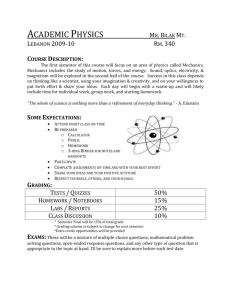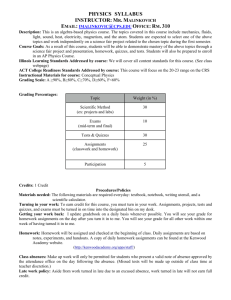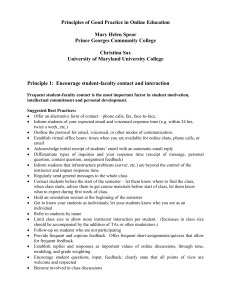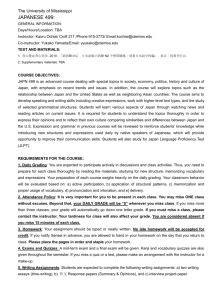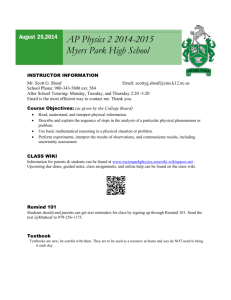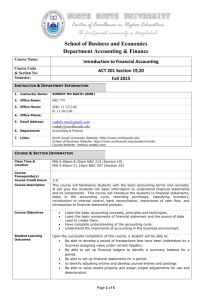Programming I Web Offering
advertisement
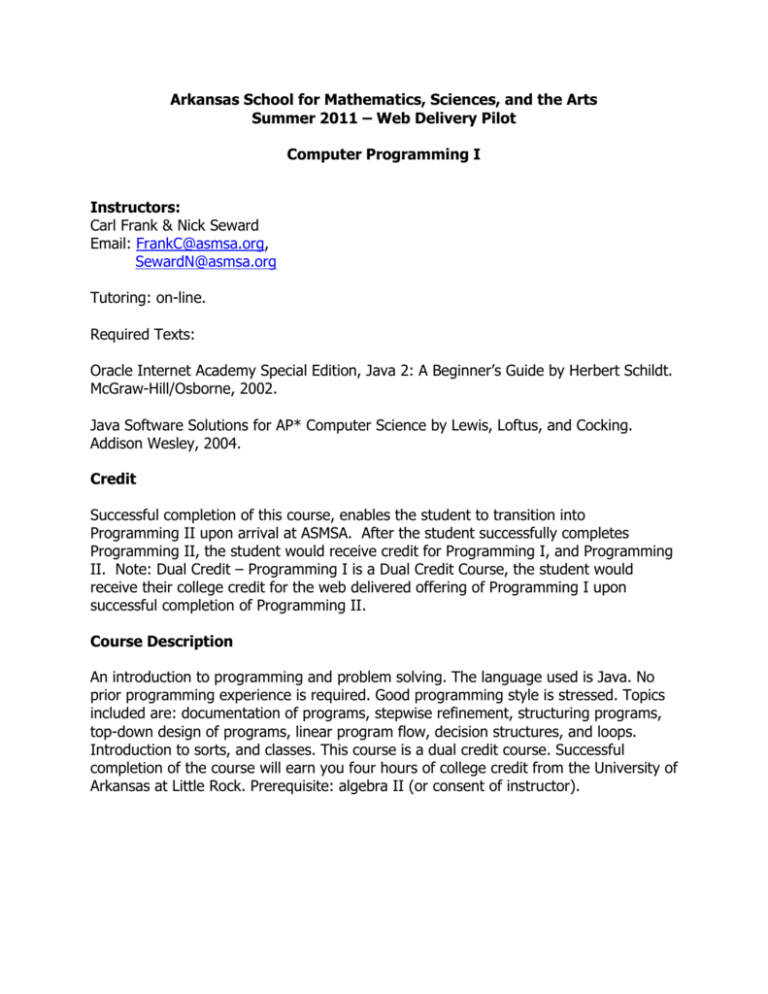
Arkansas School for Mathematics, Sciences, and the Arts Summer 2011 – Web Delivery Pilot Computer Programming I Instructors: Carl Frank & Nick Seward Email: FrankC@asmsa.org, SewardN@asmsa.org Tutoring: on-line. Required Texts: Oracle Internet Academy Special Edition, Java 2: A Beginner’s Guide by Herbert Schildt. McGraw-Hill/Osborne, 2002. Java Software Solutions for AP* Computer Science by Lewis, Loftus, and Cocking. Addison Wesley, 2004. Credit Successful completion of this course, enables the student to transition into Programming II upon arrival at ASMSA. After the student successfully completes Programming II, the student would receive credit for Programming I, and Programming II. Note: Dual Credit – Programming I is a Dual Credit Course, the student would receive their college credit for the web delivered offering of Programming I upon successful completion of Programming II. Course Description An introduction to programming and problem solving. The language used is Java. No prior programming experience is required. Good programming style is stressed. Topics included are: documentation of programs, stepwise refinement, structuring programs, top-down design of programs, linear program flow, decision structures, and loops. Introduction to sorts, and classes. This course is a dual credit course. Successful completion of the course will earn you four hours of college credit from the University of Arkansas at Little Rock. Prerequisite: algebra II (or consent of instructor). Objectives Upon successful completion of the course, the student should have acquired a basic understanding of the following concepts: The importance of internal documentation, including the use of meaningful identifiers, comment sections, and ample use of whitespace for readability The arithmetic operations, order of operations, casting, and to be able to use these to solve common business and scientific problems Keyboard input and console output Decision structures Loops Arrays Strings and basic string operations File input and output Introduction to classes There will be a number of homework/lab assignments and quizzes throughout the summer, and one exam. The exam is a final which will be taken on the ASMSA Campus at the beginning of the fall semester. The overall course grade will be determined by using a weighted or category average. The score will be based on the standard 10 point grading scale. The grading scale and the maximum possible percentage points for each category will be as follows: Grading Scale The grades will be based on the ASMSA grading scale. 90 - 100 A 80 - 89 B 70 - 79 C 60 - 69 D 0 - 59 F Grade Composition Exam - 40.00% Homework- 40.00% Quizzes 20.00% Attendance/Tardiness Daily attendance/participation is not a requirement. Students are expected to work at their own pace, as long as they satisfactorily complete assignments by the scheduled benchmarks throughout the summer as provided by the instructors. Regular and active participation in class is essential to satisfactory academic performance. Missing/Late Work The homework/lab assignments are a vital component of the course. All assignments are to be submitted to the instructor via email prior to the due dates presented to the students at the beginning of the course, unless otherwise specified by the instructor. Each day that an assignment is late, a penalty will be assessed (refer to the Student/Parent Handbook). The assessment is as follows: 1 day late – 15%, 2 days late – 30%, 3 days late – 50%, greater than 3 days late – 100%. Quizzes may be given at any time. Quizzes that are missed due to an unexcused absence will be given a score of 0. Missed quizzes due to excused absences will not be held against the student. Schedule Conflicts If a schedule conflicts occurs due to vacation, illness, etc, please contact the instructor about the possibility of alternative due dates. Acceptable Use Policy Please refer to the Acceptable Use of Electronic Information Resources (refer to the Student/Parent Handbook). Note that for the student to keep his or her account he or she must abide by the policies set forth in the handbook. Loss of computer privileges will have a considerable negative impact on your grade. If you do not know what the Acceptable Use of Electronic Information Resources policy is, ask your teacher and he will locate a copy for you. Email Communication A vital component of this course is frequent student-teacher and student-student communication. At times, it is necessary to do so asynchronously. Whenever the teacher is unavailable the preferred method of contact is through email. Another resource for electronic communication is the class wiki. Note that each course document has an associated discussion tab. You may be required to participate in discussions with your teachers and peers using this facility. Use of this wiki is required. Assignments will be disseminated via the wiki. Students should check the wiki daily. Students are encouraged to utilize these asynchronous tools to facilitate the understanding of course material. Note: Students are still encouraged to use the wiki, but the course has been moved to a Moodle site due to a server crash. Academic Honesty The Student Parent Handbook clearly states ASMSA policies regarding academic honesty. Final Exam The Final Exam for Programming Language I is scheduled to take place during the first week at ASMSA during the fall semester (junior orientation). The exam will divided into two components, a written exam component and a performance component.

